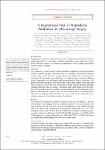A Randomized Trial of Prophylactic Antibiotics for Miscarriage Surgery
Date
2019Author
Lissauer, D.
Wilson, A.
Hewitt, C.A.
Middleton, L.
Bishop, J.R.B.
Daniels, J.
Merriel, A.
Weeks, A.
Mhango, C.
Mataya, R.
Taulo, F.
Ngalawesa, T.
Chirwa, A.
Mphasa, C.
Tambala, T.
Chiudzu, G.
Mwalwanda, C.
Mboma, A.
Qureshi, R.
Ahmed, I.
Ismail, H.
Oladapo, O.T.
Mbaruku, G.
Chibwana, J.
Watts, G.
Simon, B.
Dita, J.
Otim, C. Tom
Acam, J.F.
Ekunai, J.
Unzia, H.
Iyaku, M.
Makiika, J.J.
Zamora, J.
Robert, T.
Goranitis, I.
Bar-Zee, S.
Desmond, N.
Arulkumaran, S.
Bhutta, Z.A.
Gulmezoglu, A.M.
Coomarasamy, A.
Metadata
Show full item recordAbstract
BACKGROUND
Surgical intervention is needed in some cases of spontaneous abortion to remove
retained products of conception. Antibiotic prophylaxis may reduce the risk of
pelvic infection, which is an important complication of this surgery, particularly
in low-resource countries.
METHODS
We conducted a double-blind, placebo-controlled, randomized trial investigating
whether antibiotic prophylaxis before surgery to complete a spontaneous abortion
would reduce pelvic infection among women and adolescents in low-resource
countries. We randomly assigned patients to a single preoperative dose of 400 mg
of oral doxycycline and 400 mg of oral metronidazole or identical placebos. The
primary outcome was pelvic infection within 14 days after surgery. Pelvic infection
was defined by the presence of two or more of four clinical features (purulent
vaginal discharge, pyrexia, uterine tenderness, and leukocytosis) or by the pres-
ence of one of these features and the clinically identified need to administer anti-
biotics. The definition of pelvic infection was changed before the unblinding of
the data; the original strict definition was two or more of the clinical features,
without reference to the administration of antibiotics.
RESULTS
We enrolled 3412 patients in Malawi, Pakistan, Tanzania, and Uganda. A total of
1705 patients were assigned to receive antibiotics and 1707 to receive placebo. The
risk of pelvic infection was 4.1% (68 of 1676 pregnancies) in the antibiotics group
and 5.3% (90 of 1684 pregnancies) in the placebo group (risk ratio, 0.77; 95%
confidence interval [CI], 0.56 to 1.04; P = 0.09). Pelvic infection according to origi-
nal strict criteria was diagnosed in 1.5% (26 of 1700 pregnancies) and 2.6% (44 of
1704 pregnancies), respectively (risk ratio, 0.60; 95% CI, 0.37 to 0.96). There were
no significant between-group differences in adverse events.
CONCLUSIONS
Antibiotic prophylaxis before miscarriage surgery did not result in a significantly
lower risk of pelvic infection, as defined by pragmatic broad criteria, than placebo.
(Funded by the Medical Research Council and others; AIMS Current Controlled
Trials number, ISRCTN97143849.)
Collections
- Research Articles [11]

